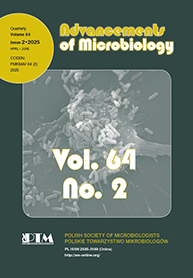1. Wstęp. 2. Występowanie. 3. Cechy morfologiczne FLAB. 4. Cechy fizjologiczne FLAB. 5. Właściwości biochemiczne FLAB. 6. Filogenetyka. 7. Krótka charakterystyka wybranych gatunków z rodzaju Fructobacillus. 7.1. Fructobacillus fructosus. 7.2. Fructobacillus ficulneus. 7.3. Fructobacillus durionis. 7.4. Fructobacillus psedoficulneus. 7.5. Fructobacillus tropaeoli. 7.6. Lactobacillus kunkeei. 7.7. Lactobacillus florum. 8. Podsumowanie
Abstract: Recently, a unique kind of lactic acid bacteria (LAB) i.e. fructophilic lactic acid bacteria (FLAB), has been described. This specific group prefers D-fructose over D-glucose as a carbon source to growth. They can be found in fructose rich environments such as flowers, fruits and food products made of fermented fruits, for example tempoyak. In recent years, it has been revealed that insects which feed on food high in fructose are an abundant source of fructophilic bacteria. Bacterial communities inhabiting intestinal tracts of honeybees, bumblebees, Camponotus ants and tropical fruit flies were examined. At present FLAB includes six species: Fructobacillus fructosus, Fructobacillus durionis, Fructobacillus ficulneus, Fructobacillus pseudoficulneus, Fructobacillus tropaeoli and Lactobacillus kunkeei classified by Endo as obligatorily fructophilic, and only one species, namely Lactobacillus florum, as facultatively fructophilic. Latest publications describe new species of potential fructophilic characteristics, which suggests that there is still much to discover in that group.
1. Introduction. 2. Occurrence / Habitat. 3. Morphological characteristics of FLAB. 4. Physiological characteristics of FLAB. 5. Biochemical properties of FLAB. 6. Philogenetics. 7. Characterization of selected species of the genus Fructobacillus. 7.1. Fructobacillus fructosus. 7.2. Fructobacillus ficulneus. 7.3. Fructobacillus durionis. 7.4. Fructobacillus psedoficulneus. 7.5. Fructobacillus tropaeoli. 7.6. Lactobacillus kunkeei. 7.7. Lactobacillus florum. 8. Summary

